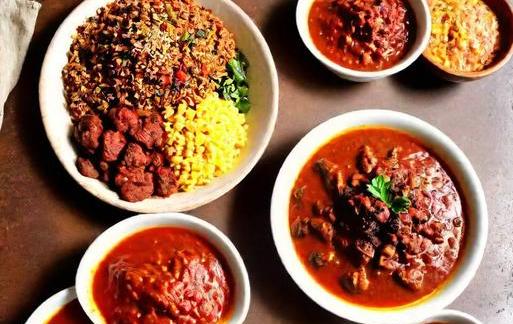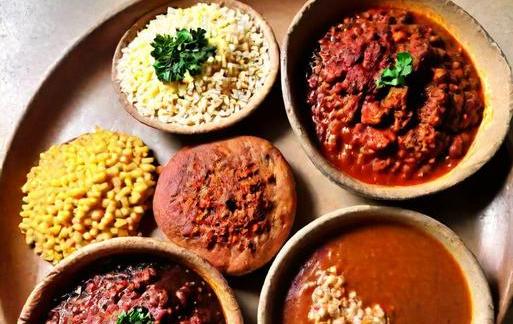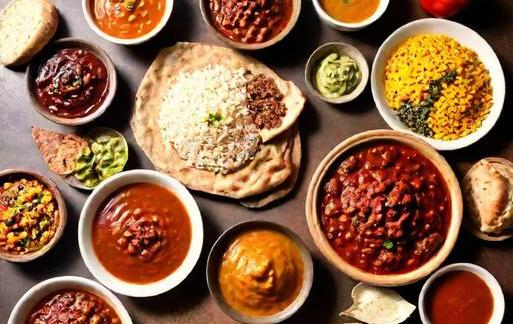- You are here:
- Home »
- Food
- » [REVEALED] African Foods That Start With N
[REVEALED] African Foods That Start With N
Note: This page contains affiliate links.
As an Amazon Associate, I earn from qualifying purchases when you click on the link, but you are not charged extra.
African cuisine is a rich tapestry of flavors, reflecting the diverse cultures, climates, and landscapes across the continent. Exploring the vast array of dishes reveals the unique ingredients and cooking techniques that have been passed down through generations. In this culinary exploration, we delve into the world of African foods that start with the letter “N”. From savory stews to exotic fruits, this list showcases the diversity and complexity of African gastronomy.
Contents
List Of African Foods That Start With N

1. Nshima (Zambia, Malawi)
Nshima, a staple in Zambia and Malawi, is a versatile and hearty dish made from maize flour. This thick porridge-like food is often served alongside savory stews, providing a substantial base for various toppings. Its neutral taste allows it to complement a wide range of flavors, making it a cornerstone of Southern African cuisine.
2. Nsala Soup (Nigeria)
Originating from the Igbo people in Nigeria, Nsala Soup, also known as "white soup," is a delectable delicacy. It features catfish or other types of fish, yams, and a unique blend of spices. The result is a rich, flavorful soup with a slightly spicy kick. Nsala Soup holds cultural significance and is often served during special occasions and celebrations.
3. Niter Kibbeh (Ethiopia)
Niter Kibbeh is a spiced clarified butter that adds depth and aromatic complexity to Ethiopian dishes. It is a fundamental component of Ethiopian cuisine, used in various stews and traditional dishes. The butter is infused with a medley of spices such as garlic, ginger, and fenugreek, creating a fragrant and flavorful cooking medium.
4. Ntaba (Malawi, Zambia)
Ntaba, a popular dish in Malawi and Zambia, consists of grilled or roasted meat, often goat or beef, seasoned with a blend of spices. The meat is typically skewered and cooked over an open flame, imparting a smoky flavor. Ntaba is enjoyed as a street food snack or as part of a festive meal, showcasing the diverse culinary traditions of the region.
5. Ndole (Cameroon)
Ndole is a traditional Cameroonian dish that features a savory stew made from groundnuts, ndoleh leaves, and various proteins such as fish, shrimp, or beef. The dish embodies the rich and complex flavors of Cameroonian cuisine, with the bitterness of the ndoleh leaves balanced by the nutty sweetness of groundnuts. Ndole is often served with plantains or rice, creating a satisfying and well-rounded meal.
6. Nkatenkwan (Ghana)
Nkatenkwan, also known as groundnut soup or peanut soup, is a beloved dish in Ghana. This hearty soup combines peanuts, tomatoes, and various spices to create a flavorful and aromatic broth. It is often prepared with chicken, fish, or goat meat, adding protein to the dish. Nkatenkwan is typically served with fufu, a starchy side dish made from cassava, yams, or plantains.
7. Nhopi (Zimbabwe)
Nhopi is a traditional Zimbabwean dish made from mashed sweet potatoes or pumpkins, combined with groundnuts and sugar. This sweet and savory dish is a delightful blend of flavors and textures, showcasing the creativity and resourcefulness of Zimbabwean cuisine. Nhopi is often enjoyed as a dessert or snack, offering a unique taste of Zimbabwean culinary heritage.
8. Nkosi (South Africa)
Nkosi, a South African dish, is a flavorful stew made from tripe and trotters. The dish is seasoned with a combination of aromatic spices, creating a rich and savory broth. Nkosi is often enjoyed with steamed bread or pap, a traditional South African porridge made from maize meal. This dish reflects the diverse and bold flavors that define South African cuisine.
9. Njahi (Kenya)
Njahi, also known as black peas or dolichos lablab, is a nutritious legume that plays a significant role in Kenyan cuisine. These small, dark beans are often used in stews, soups, or simply boiled and seasoned for a wholesome side dish. Njahi is not only delicious but also packed with protein and essential nutrients, making it a staple in many Kenyan households.
10. Nkate Cake (Ghana)
Nkate Cake is a traditional Ghanaian dessert that showcases the versatility of peanuts. This sweet treat is made from roasted and ground peanuts, combined with sugar and spices to create a dense and flavorful cake. Nkate Cake is a popular snack during celebrations and gatherings, providing a delightful ending to a Ghanaian meal.
Embarking on a culinary journey through African foods that start with the letter 'N' reveals the richness and diversity of the continent's gastronomic landscape. From the hearty Nshima in Zambia to the aromatic Niter Kibbeh in Ethiopia, each dish tells a story of tradition, innovation, and the vibrant cultures that shape African cuisine. As we explore these foods, it becomes evident that African gastronomy is a celebration of local ingredients, culinary expertise, and the joy of communal dining. Whether it's the spicy kick of Nsala Soup in Nigeria or the sweet and savory combination of Nhopi in Zimbabwe, each dish offers a unique sensory experience. The list of African foods that start with 'N' is just a glimpse into the vast and varied world of African cuisine. It invites us to appreciate the intricate flavors, techniques, and cultural significance embedded in each dish. As we savor these culinary delights, we not only indulge in delicious meals but also gain a deeper understanding of the diverse and dynamic culinary traditions that define the African continent.
Significance

Africa, with its rich tapestry of cultures and cuisines, is a continent that captivates the senses. Among its culinary treasures are foods that start with the letter "N," each carrying a unique story and flavor profile.
African cuisine is a testament to the continent’s diverse landscapes, history, and cultural heritage. The foods that start with "N" not only showcase the abundance of natural resources but also reflect the resourcefulness of African communities in turning these ingredients into flavorful dishes. Exploring these foods allows us to understand the deep connection between African people and their environment, fostering an appreciation for the culinary traditions that have been passed down through generations.
Category-Related

1. Nshima (Zambia, Zimbabwe, Malawi)
Nshima, a staple in Southern Africa, is a versatile dish made from ground maize or millet. Its significance lies in its role as a communal meal, often shared among family and friends. The preparation involves cooking the maize or millet flour with water to achieve a smooth, thick consistency. Nshima is commonly served with a variety of accompaniments such as vegetables, meats, or fish, creating a harmonious blend of textures and flavors.
2. Nsala Soup (Nigeria)
Hailing from the Igbo people of Nigeria, Nsala Soup is a delicacy that highlights the region’s culinary prowess. Also known as "white soup," it features catfish as the main ingredient, giving it a distinct taste. The soup is prepared with a blend of spices, utazi (a bitter leaf), and yam for thickness. Nsala Soup not only tantalizes the taste buds but also reflects the cultural importance of communal dining and the art of flavor balance in Nigerian cuisine.
3. Ntaba (Malawi, Zambia)
Ntaba, a grilled meat dish originating from Malawi and Zambia, is a carnivore’s delight. Typically made with goat meat, Ntaba is seasoned with a blend of spices and grilled to perfection. The result is a smoky, succulent dish that showcases the culinary expertise of these regions. Ntaba not only serves as a flavorful delight but also symbolizes the communal spirit of gatherings around a shared meal, a common theme in African culture.
4. Nyama Choma (East Africa)
Nyama Choma, a popular dish in East Africa, is a celebration of grilled meat. The preparation involves marinating chunks of meat in a flavorful mix of spices, then grilling them to perfection. This dish transcends its culinary significance, becoming a social activity where friends and family gather to enjoy the aromatic and savory delight of Nyama Choma. It exemplifies the importance of communal dining and the art of grilling in East African culinary traditions.
Common Themes
1. Communal Dining
A recurring theme in African cuisine is the emphasis on communal dining. Whether it’s the sharing of Nshima in Southern Africa or the communal enjoyment of Nyama Choma in East Africa, food serves as a catalyst for bringing people together. The act of sharing a meal is more than sustenance; it’s a cultural ritual that fosters a sense of community and togetherness.
2. Resourcefulness
African cuisines often showcase the resourcefulness of communities in utilizing locally available ingredients. Whether it’s the use of maize in Nshima or the incorporation of indigenous spices in Nsala Soup, these dishes reflect a harmonious relationship between the environment and culinary practices. This resourcefulness is a testament to the ingenuity of African communities in creating flavorful and satisfying meals with what nature provides.
3. Celebration Of Meat
Many African dishes, including Ntaba and Nyama Choma, highlight the celebration of meat. In these cultures, meat is not just a source of protein; it’s a symbol of festivity and abundance. The meticulous preparation and grilling techniques showcase a deep appreciation for the flavors and textures that different cuts of meat can offer. The communal aspect of sharing grilled meat further enhances the celebratory nature of these dishes.
Interesting Facts
-
Nigeria’s Diverse Soups: Nigeria, known for its diverse culinary landscape, boasts an impressive array of soups. Nsala Soup is just one example, and each region within Nigeria has its own unique soup variations, showcasing the country’s rich gastronomic diversity.
-
Influence of Indigenous Spices: The use of indigenous spices in African cuisine is not just about flavor; it’s also deeply rooted in traditional medicine and cultural practices. Many spices used in dishes that start with "N" have both culinary and medicinal significance, reflecting a holistic approach to well-being.
-
Culinary Rituals in East Africa: Nyama Choma isn’t just a meal; it’s a culinary ritual in East Africa. The preparation and consumption of grilled meat are often accompanied by music, dance, and storytelling, creating an immersive experience that transcends the act of eating.
-
Ntaba’s Symbolic Significance: In Malawi and Zambia, Ntaba holds symbolic significance in ceremonies and celebrations. The grilling of meat is not just a culinary skill but a cultural expression of joy and unity.
Conclusion
Exploring African foods that start with the letter "N" unveils a rich tapestry of flavors, cultural significance, and communal traditions. From the versatile Nshima to the celebratory Nyama Choma, these dishes provide a window into the diverse culinary landscape of the continent. The common themes of communal dining, resourcefulness, and the celebration of meat underscore the cultural importance of food beyond mere sustenance. As we savor the flavors and stories behind these dishes, we gain a deeper appreciation for the culinary wonders that Africa has to offer. Let this exploration serve as an invitation to further delve into the vast and vibrant world of African cuisine, where each dish is a celebration of heritage and a testament to the artistry of culinary traditions.


